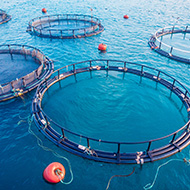Stress insights may inform fish breeding strategies - study

“Our research should help gain new knowledge of health and welfare and aid the development of non-invasive tools to monitor stress in fish and seafood species" - Dr Tim Bean, Roslin Institute.
Researchers at the University of Edinburgh are seeking to discover how to breed fish with greater resilience to disease or environmental stress.
Led by experts at the Roslin Institute, the four-year study will investigate ways to recognise signs of stress in fish and examine fish DNA to ascertain whether their responses to stress are inherited.
Forming part of a €6m series of studies concerning sustainability in fish, scientists hope their findings could be used to develop strategies that promote improved health and welfare.
Dr Tim Bean, a research fellow at the Roslin Institute, said: “It is essential that we understand how fish and seafood respond to stress and incorporate the findings in breeding strategies so that animals may experience good health and welfare within food production systems.
“Our research should help gain new knowledge of health and welfare and aid the development of non-invasive tools to monitor stress in fish and seafood species.”
In the study, researchers will analyse the stress responses of key Mediterranean fish species to vaccination and handling. They aim to pinpoint and measure biological indicators of typical stressors through stress hormones and other molecules emitted into the environment by fish.
Scientists also hope to discover whether these responses to stress are hereditary and compare the genetic codes of fish exhibiting various stress responses to identify relevant areas of DNA. The results will be used to improve techniques for assessing stress responses, including physical characteristics linked to resilience.
It is hoped the research will help enhance the wellbeing of fish and shellfish by making it possible to identify animals whose DNA suggests they are robust to stress.



 The Veterinary Medicines Directorate (VMD) is inviting applications from veterinary students to attend a one-week extramural studies (EMS) placement in July 2026.
The Veterinary Medicines Directorate (VMD) is inviting applications from veterinary students to attend a one-week extramural studies (EMS) placement in July 2026.